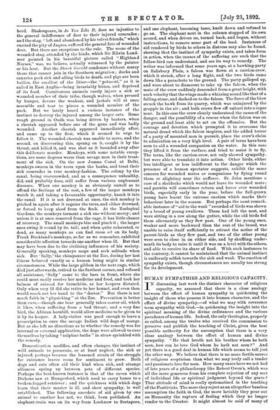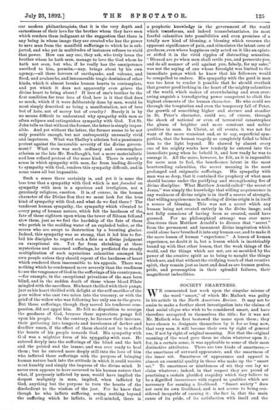HUMAN SYMPATHIES AND RELIGIOUS CAPACITY.
IN discussing last week the distinct character of religious capacity, we assumed that there is a close analogy between the effect of human sympathy in quickening the insight of those who possess it into human character, and the effect of divine sympathy,—of what we may with reverence term sympathy with God,—in quickening the insight into the spiritual meaning of the divine ordinances and the various paradoxes of human life. Indeed, the only theologian, properly so called, among the twelve who received the commission to preserve and publish the teaching of Christ, gives the best possible authority for the assumption that there is a very close analogy between the effect of human and divine sympathy. " He that loveth not his brother whom he hath seen, how can he love God whom he bath not seen P" And yet there is a good deal in human life which seems to tell just the other way. We believe that there is no more fertile source of religious scepticism than what we may truly call a tender and passionate love for man. How many cases have we not had of late years of a philanthropy like Robert Owen's, which was all the more generous from his complete rejection of any sort of individual life or spiritual judgment beyond the grave ? That attitude of mind is really systematised in the teaching of the Positivists. The more they reject as an altogether baseless assumption the faith in God, the more lavishly they pour out on Humanity the rapture of feeling which they no longer render to the Creator. It might almost be said of many of
our modern philanthropists, that it is the very depth and earnestness of their love for the brother whom they have seen which renders them indignant at the suggestion that there is any being in whose image they are created who has the power to save man from the manifold sufferings to which he is sub- jected, and who yet in multitudes of instances refuses to wield that power. How can any one, they ask, who truly loves the brother whom he hath seen, manage to love the God whom he hath not seen, but who, if he really has the omnipotence ascribed to him, permits,—nay, brings about by his own agency,—all these horrors of earthquake, and volcano, and flood, and avalanche, and innumerable tragic destinies of other kinds, which it almost breaks human hearts to contemplate, and yet which it does not apparently even grieve the divine heart to bring about? If love of one's brother be the first condition for true love of God, how is it that God does so much, which if it were deliberately done by men, would be most simply described as being a manifestation, not of love but of hate, not of mercy but of cruelty? Surely it is by no means difficult to understand why sympathy with men so often eclipses and extinguishes sympathy with God. Yet St. John tells us that without the former, the latter is simply impos- sible. And yet without the latter, the former seems to be not only possible enough, but not unfrequently unusually vivid and impetuous. What was Shelley's atheism but a passionate protest against the inexorable severity of the divine govern- ment? What even was such ordinary and commonplace atheism as the late Mr. Bradlaugh's, but a more materialistic and less refined protest of the same kind. There is surely a sense in which sympathy with men, far from leading directly to sympathy with God, renders this sympathy difficult, and in some cases all bat impossible.
Such a sense there certainly is, and yet it is none the less true that a sympathy with God which is not founded on sympathy with men is a spurious and irreligious, not a genuinely religious, emotion. It is, of course, in the human character of the Divine Son that we must look for the true kind of sympathy with God, and what do we find there ? The tenderest human sympathy, the sympathy which vibrated to every pang of human nature, which felt the hardness of the, fate of those eighteen upon whom the tower of Siloam fell and slew them, just as we feel the hardship of the fate of those who perish in the scalding water of an exploded boiler, or the scores who are swept to destruction by a bursting glacier. Indeed, this sympathy was so strong, that it led him to for- bid his disciples to regard such a fate as a divine judgment on exceptional sin. Yet far from shrinking at these mysterious and unearned sufferings, he predicted the steady multiplication of such mysterious calamities amongst his own people unless they should repent of the hardness of heart which rendered them inaccessible to his appeals. There was nothing which he condemned more severely than the readiness to see the vengeance of God in the sufferings of his countrymen, —for example, in the exceptional privations of the man born blind, and in the sudden death of those whose blood Pilate mingled with the sacrifices. His heart thrilled with their pangs, just as his heart thrilled with delight at the self-sacrifice of the poor widow who cast two mites into the treasury, or with the grief of the widow who was following her only son to the grave. Bat these sufferings, though they moved his tenderest com- passion, did not appal him. He felt no disposition to arraign the goodness of God, because these mysterious pangs fell upon his people. On the contrary, he foresaw their increase, their gathering into tempests and hurricanes of darker and deadlier omen, if the effect of them should not be to soften the hearts of his people towards God. His sympathy with Gx1 was a mightier form of his s upa athy-,4vith man. He entered deeply into the sufferings of the blind and the halt and the palsied and the insane, and was ever ready to heal them ; but he entered more deeply still into the love of him who inflicted these sufferings with the purpose of bringing human nature back into the attitude in which it could receive most humbly and simply the impress of the divine mind. It never even appears to have occurred to his human nature that what, if purposely inflicted by man, would have implied the deepest malignity in man, implied, when inflicted by God, anything but the purpose to turn the hearts of the disobedient to the wisdom of the just. For he knew that though he who inflicts suffering, seeing nothing beyond the suffering which he inflicts, is evil-minded, there is a prophetic knowledge in the government of the world which transforms, and indeed transubstantiates, its most fearful calamities into possibilities and even promises of a totally new kind of blessing, a blessing which reverses the apparent significance of pain, and stimulates the latent core of goodness, even where happiness only acted on it like an opiate, or stifled it in the vivid ripples of distracting sensation. "Blessed are ye when men shall revile you, and persecute you, and do all manner of evil against you, falsely, for my sake," was not the saying of one whose foresight was limited to the immediate pangs which he knew that his followers would be compelled to endure. His sympathy with the good in man was too keen to render it possible that he should overlook that greater good lurking in the heart of the mighty calamities of the world, which makes of overwhelming and even over- awing anguish a transfiguring power competent to elicit the highest elements of the human character. He who could see through the temptation and even the temporary fall of Peter, the growth of something higher and sterner and steadier in St. Peter's character, could see, of course, through the shock of national or even of terrestrial catastrophes the gleam of brighter and more constant and nobler qualities in man. In Christ, at all events, it was not for want of the more transient and, so to say, superficial sym- pathies, that the human tragedy so completely failed to blind him to the light beyond. He showed by almost every one of his mighty works how tenderly he entered into the immediate pang when he beheld it, and how ready he was to assuage it. All the more, however, he felt, as it is impossible for, mere man to feel, the beneficence latent in the most heartrending calamities, the secret meaning in the most prolonged and enigmatic sufferings. His sympathy with man was so deep, that it contained the prophecy of what man should become under the purifying and strengthening fire of divine discipline. What Matthew Arnold called " the secret of Jesus," was simply the knowledge that willing acquiescence in any weakness of divine origin is in itself a source of strength, that willing acquiescence in suffering of divine origin is in itself a source of blessing. This was not a secret which any human being not created entirely in the divine image, and not fully conscious of having been so created, could have guessed. For no philosophical attempt was ever more disastrous than Matthew Arnold's to divorce that " secret" from the permanent and immanent divine inspiration which could alone have breathed it into any human ear, and to make it the mere lesson of human " experience." A lesson of human experience, no doubt it is, but a lesson which is inextricably bound up with that other lesson, that the weak things of the world, and the things which are not, are so moulded by the power of the creative spirit as to bring to naught the things which are, and that without the vivifying touch of that creative spirit, they remain just as inert and dead as are human genius, pride, and presumption in their splendid failures, their magnificent imbecilities.



































 Previous page
Previous page